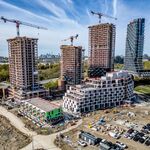Glen
Senior Member
hmm the idea sounds great, but the attempted luring of Procter and Gamble scares me ... a lot in fact.
What's the idea here? To spread employment across the 416? Moving one company to another location from an already employment zoned (and a pretty good one at that) to another seems like a mistake in the long term.
Why are they not focusing on luring companies that are currently not in Toronto? If they need to expand, and that can't be done at their current site, that's another story.
This is just like the Corus building. Moving jobs from one area of the city to another, to declare something a success. The real question is why is the city acting as a developer? If this is a viable project, sell the land and have a private company develop it.
More likely, this is the only way to ensure that something other than more condos get built. On top of that, what it adds to the non residential assessment base (more than likely) will be offset by diluting the existing values. What matters is an increase in demand, not sq footage.




